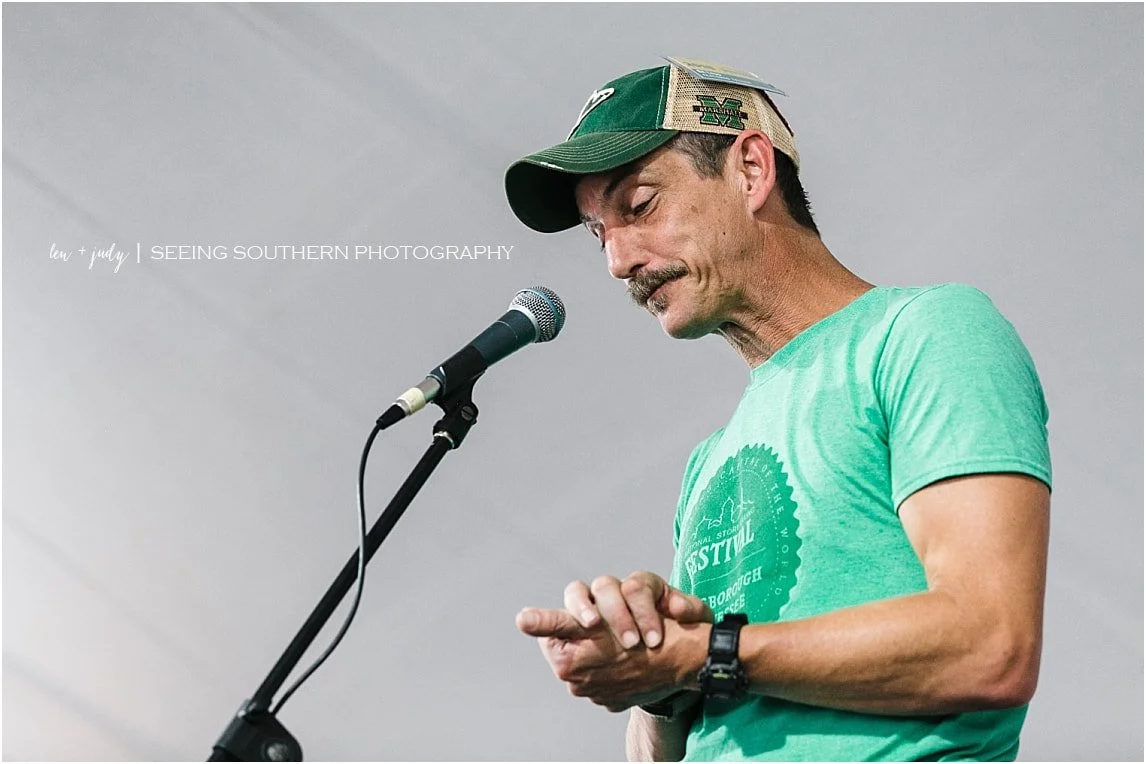Love’s Farewell Tour with Donald Davis
“We must be willing to let go of the life we planned so as to have the life that is waiting for us.”
Original Post | October 6, 2018
Webster's defines a storyteller as a "relater of anecdotes, a reciter of tales."
Sounds rather easy and matter-of-fact.
To the International Storytelling Center in Jonesborough, Tennessee, they see storytellers and their worldwide organization like this: "to inspire and empower people across the world to accomplish goals and make a difference by discovering, capturing, and sharing their stories."
What a job! To make a difference . . .
To them, everyone is a storyteller. You and me, for, after all, our lives are made up of a chain of stories stringing childhood to old age and who better to convey them that the ones who have a front row seat as the yarn unravels. They assert that people "crave, remember and honor stories." I believe that, but I don't think you grasp how much you fancy a good story until you're sitting in the presence of someone who is painting, weaving, building, and composing one in front of your very own eyes.
And when the tale is done, you exhale and you are different. There's no getting around it. The words facilitate ideas, passions, loves, and convictions. And all this is possible when words paint a picture.
As our Jeep bounced through every divot in the freshly cut Jonesborough Elementary School front lawn, we said thanks that our chariot was tougher than we were. Although early at 9 a.m., there were hundreds who did not hit the snooze button like we did at The General Morgan Inn; endless rows of vehicles filled every empty make-shift spot sporting license plates from every neighboring state, even one from California. In the past few years, the festival had grown so large that shuttles (a.k.a. school buses) were added. For the price of a latte, you could park your car and hitch a ride to downtown Jonesborough in the yellow bus.
Final accounts stated that over 10,000 assembled in this tiny Tennessee town, joining people all over the world in laughter and tears. The furthest, New Zealand.
On board, it became obvious that many were returning lovers of the tale and of the event. "This festival is the level of civility people have for one another," said Johnson City's Eric Harin. There's good people here; everyone around us nodded in agreement.
The five minute ride took us to the visitor's center. The second we stepped from the bus, laughter and applause roared from the tent behind us. Someone said in passing, "That must have been a good story."
From tent to tent, we moved, listening to tales of exaggerations and truths, of friends who had died since the last festival, making it hard to be here without them; singer-songwriter John McCutheon's unforeseen cancer diagnosis that provided 10 weeks of the best (and productive) alone time ever and how he absolutely knew that he and nine-year-old Jesus would have been best buddies; childhood pranks between Bil Lepp and buddy Skeeter that involved church, garden hoses, pennies (in case you're wondering, you can only make it 1/3 mile with a Wonderbread bag filled with 500 pennies), baptismal pools, and goats; oh, and a water bar in New York City completely devoid of fresh geyser water from West Virginia. In the middle of Bil Lepp's untamed accounts, we were reminded that "storytelling is educational." Laughter would always break out and the ohhs and ahhs would float heavenward, all at the most pure moment. As spur-of-the-moment as all of it seemed, the narratives, all choreographed and scripted, glued attentive faces to the teller as his hands and voice flowed in unison. And it was good.
Saying Goodbye
And then, we spent the most beautiful hour with Donald Davis. I don't dare tell you his entire tale for I don't want you to miss the opportunity to hear it from him. That would make me a thief.
We had followed the man in seersucker, wing tips, witches broom bow tie and straw hat from the middle of town to the College Street Tent. It had to be him, I told Len. Who else could rock a suit and look that dashing in 90 degree heat? He entered the tent and confirmed his rock star status. Something special was about to happen.
I'll start at the end.
With Len at the stage photographing Davis, I had been sitting mid-way back, alone in a crowd of about 500. I had to find him. We met at our rendezvous point, and once I caught sight of him, the tears flowed uncontrollably. He grabbed me and I grabbed him, the result of listening to a story where the characters absorbed our souls.
Earlier in the day, we had traveled with Davis to his first job, his first paycheck and the reality of paying taxes. To make a point, his father provided him a copy of the federal budget and told him to "find something you like." All that money the government will forever take out of your paycheck will be paying for that. Look at taxes like that. Davis tore out the part about The National Park Service, and to this day, he considered the national parks his - all the parks. After all, he has paid for them. Then he took us to the Grand Canyon with a front row seat for he and his wife Merle's adventures on donkeys on the Bright Angel Trail. Where would he take us now?
He began with the four male influences in his life, his father and his father's brothers. Through his eyes, he narrated their lives and deaths. Then, there was Merle, his wife. He met her at 40 when she was only 25; he knew she was the one. Their adventures took them all over the world, traveling and telling stories at endless festivals and events. They would always return home to Ocracoke Island on the OuterBanks of North Carolina.
Suddenly, he threw in a past tense verb, and I realized where the story was going. Heath issues began seven years back, one after the other, and through each new diagnosis, she never complained. She didn't even complain about the wheelchair because "it was easier for me." And in that chair, he pushed her 96 miles during their trip to Disneyworld. And last summer, her "one more trip" took them through 23 states and 21 national parks (all of which he owned, he was quick to point out). And at each park, she dropped a marble - "so you'll come back and get it."
With that, the noticeable silence was deafening, and soon, random sniffles engulfed the quiet. He compared her experience to piano keys, and how one by one, each note would grow silent.
"It was a wonderful departure," he said. "I think it was planned by her." In the middle of the night, one moment she was there, a second later, gone. "There was no reason to call anyone when we have the rest of the night together." He voiced how her "reminded" her the rest of the night of their travels, their experiences, their life together.
He shared of the "lightning strike" when she spoke to him weeks later - twice. And when he finally figured out what she was saying, it all made sense. To let go and have fun, so that one day when they were together again, they'd have even more stories to share.
And then, he reached in his pocket and pulled out a bag and sprinkled its contents in front of him. He shared how he always took a part of her with him wherever he went and would leave a part of her there. He would continue to do so for the rest of his life.
"Don't be sad if you walk on her. Don't be sad if you get some of her on you. This is exactly what she would have wanted. Thank you for helping me say goodbye to my Merle."
I have thought about his story every day since returning home. I have cried each time I have told someone of our experience in Jonesborough. When Len and I came together after hearing Davis, Len said, "That's our love." Then, I cried a little more.
Storytellers recount their stories, and ironically, they become a mirror. We hold it up to our eyes, and we see ourselves. There's no escaping. Their story could be our story, only with different characters, varied emotions and assorted settings.
As Davis unraveled his story, I knew where he was going, but the mystery of how he would get us there produced the spark. Through laughter and tears, all 500 people underneath that tent were on the same page, grabbing each other for comfort and understanding that the stories each one of us can tell is important to our lives, to our history, to our future.
A simple story has power. Our story has power. We simply must share it .








